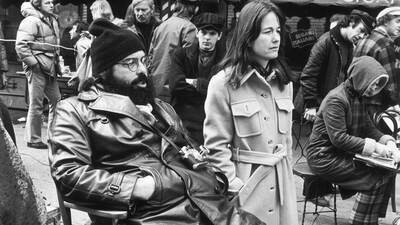Any creative person lucky enough to have a lifelong partner knows how that person fills many roles: support staff, cheerleader, wise counsel, the keeper of dark secrets. But “Hearts of Darkness,” which credits her as “Documentary Footage Directed by Eleanor Coppola,” brought those secrets out into the light. Francis’ suicidal thoughts are on display, as well as his anger and his moments of wild inspiration. (Plus, we hear a candid phone conversation he has with a business partner in which he pointedly orders that, even if Sheen dies from that heart attack, no one is permitted to say anything until Francis does.) Eleanor’s quiet powers of observation captured all these incredible snippets, but she also documented her own anxiety at watching what her husband was going through. As she makes clear in her narration, she’s going through it, too—it is their shared ordeal. When you really love someone, that’s what happens.
Not that “Hearts of Darkness” is as forthright as Eleanor’s own journals. The documentary makes no mention of Francis’ affair, which is alluded to in the book she published in 1979, Notes. Nor are there insights about the Coppolas discussing getting divorced. (In her book, she writes, “[I]t has taken until now for me to accept that the man I love, my husband, the father of my children, the visionary artist, the affectionate family man, the passionate and tender lover, also can lie, betray and be cruel to people he loves.”) The Francis we meet in “Hearts of Darkness” isn’t cruel, merely crazed—the hero of a familiar, feel-good narrative in which a mighty artist suffers, the odds against him, ultimately to emerge triumphant.
It’s a narrative that gives aspiring filmmakers hope—If I just torture myself enough, I too will be revealed as a genius—but it elides the emotional labor others have to do to support that vision. Which is why some of Eleanor’s footage—which Bahr and Hickenlooper, to their credit, elected to include—feels like a correction to that power imbalance. Francis Ford Coppola may be shown as a grandiose auteur—the documentary opens with his brazen statement at the film’s Cannes premiere in which he declared “Apocalypse Now” is not about Vietnam but, rather, is Vietnam—but he can also come across as foolish, klutzy and confused. He’s so in his own head at one point as he walks around the set that he bonks his noggin on a lightbox. Sometime later, he surveys a location and then, to no one, asks for a club soda like he’s a big, helpless kid. The Great Man can sometimes be a regular doofus, the documentary puncturing the myth of the genius. Truth is, filmmaking is so often about failure, and Eleanor saw it up close. The unguarded intimacy of these vulnerable moments is another illustration of an abiding, weathered love.

